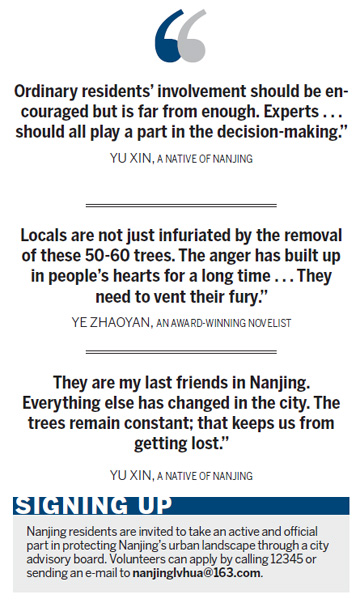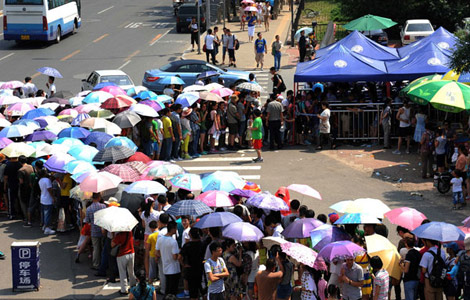

Two angry writers
Essayist Xue Bing told China Daily there used to be more than 20,000 plane trees in Nanjing. He has spent most of his life in the city, has written about anecdotes of old Nanjing, and is active in preservation of the local heritage.
Nanjing is one of the four hottest cities in China in summer, he said, but when he went to school in the 1960s, "it was not at all hot on the way, as it was at least 4 to 6 degrees cooler in the shade of the trees. No hats or umbrellas were needed, not at all."
The green landscape remained largely the same until the 1990s, he said, when construction of hundreds of high-rise buildings led to denser population, more traffic and fewer trees.
|
 |
He described some of the lost trees as so large that two adults stretching to reach around the trunk - like hugging the tree - could barely touch hands. It takes 60-80 years to grow trees that size, he said, which is why locals care so much about them.
"They should have kept the old downtown area intact, and have all the new plans carried out in the suburban area," Xue said.
The downtown area, rich with cultural relics, occupies only one-10th of the city, he said. "They learned to protect important historical buildings, but forgot about our trees."
"Nanjing would have been a city of much higher quality" if the trees had been saved, said Ye Zhaoyan, an award-winning novelist whose major works are set in Nanjing.
"Locals are not just infuriated by the removal of these 50-60 trees. The anger has built up in people's hearts for a long time . . . They need to vent their fury."
The city "promised to grow new trees when the construction is finished," he said in a telephone interview, "but it takes 60 years for them to grow into today's size. However much money you have, where can you buy me the 60 years?"
Collecting smiles
On Saturday, hundreds of residents gathered in front of the Nanjing Library, some with green ribbons tied on their arms or to bags.
Some chose other ways to express their concerns. A Nanjing-based environmental group named Green Stone started an online campaign, collecting people's smiling faces in support of protecting trees.
Volunteers would go to public spaces and hand out leaflets that said, "Your smile will save our trees," and ask the passers-by to have a photo taken holding that slogan.
Hundreds of pictures, featuring people young and old, white-collar workers and street sweepers, were posted on a micro blog on Sina.com.
"The city administrators responded quite promptly to public opinion," said Yu Xin, one of the leaders of the "smile" campaign.







